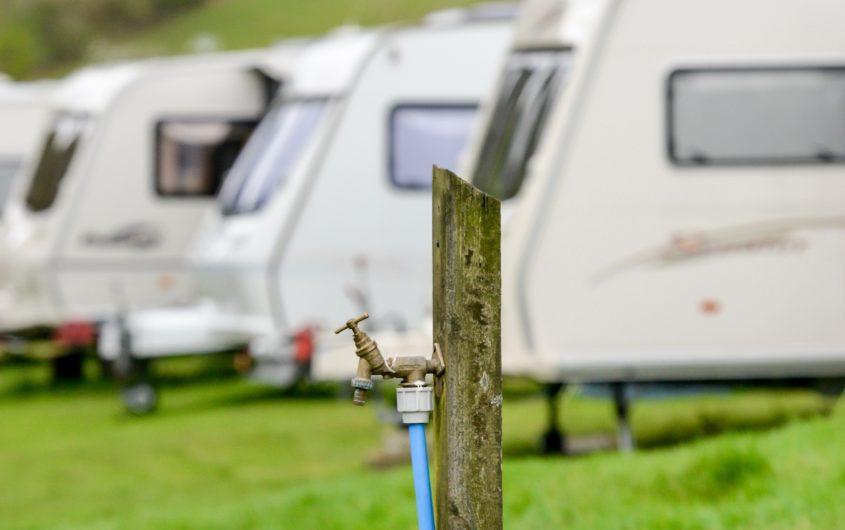
Water Justice for Mobile Home Residents UCLA Luskin School study highlights substandard water service and quality in California’s mobile home parks
By Stan Paul

Gregory Pierce
Although California officially recognizes the right to safe, clean, affordable and accessible water for all citizens, the Human Right to Water law passed in 2012 has no teeth, according to Urban Planning researchers at the UCLA Luskin School of Public Affairs.
In a new study, co-authors Gregory Pierce MA UP ’11 PhD ’15 and Silvia González MURP ’13 looked at drinking water access and quality in mobile home parks, a significant but often overlooked segment of the California population.
“Right now, I don’t think state and local policymakers are focusing nearly enough attention on this issue,” said Pierce, an adjunct assistant professor of urban planning and a senior researcher on water and transportation initiatives at the UCLA Luskin Center for Innovation.
The study, published this month in the journal Environmental Justice, is titled “Public Drinking Water System Coverage and its Discontents: The Prevalence and Severity of Water Access Problems in California’s Mobile Home Parks.” Co-author González, who has collaborated with Pierce on a number of drinking water-related studies, is a doctoral student in urban planning and assistant director of the Center for Neighborhood Knowledge at UCLA Luskin.
Although some existing research broadly suggests that water service and quality in the state’s mobile home parks is substandard, Pierce and González said that a lack of literature and targeted studies on the subject spurred their research, which is based on a range of quantitative and qualitative sources, including more than 1,300 news reports related to mobile home water access.

Silvia Gonzalez
The study concluded that mobile home parks are:
- likely to incur more health-related violations than other systems
- four times more likely to experience a significant service shutoff (more than 24 hours)
- 40 percent more likely to rely on groundwater, a known risk for reliability and quality
In their report, the authors said they were surprised to find that available data on water system reliability suggests that mobile home parks in California are as likely as the general population to be served by community water systems. The authors pointed out that mobile home parks are more likely to have small water systems, a characteristic well-documented to diminish access.
“This demonstrates that any deficiencies in water service in parks are indeed problems for which the public sector maintains oversight and authority to rectify,” the researchers said in the study.
Pierce and González also found that evidence on affordability was less conclusive, but it suggested that the cost of drinking water could pose an “outsized” burden on some mobile home park residents who, because of reliability and quality, may purchase bottled water, which is more expensive than alternative water sources.
Pierce, who presented the study findings at the 2017 Water and Health Conference held Oct. 16-20 at the University of North Carolina’s Gillings School of Global Public Health, said that he hopes progress will be made in the coming years, “but the trend is not promising at this point.”
“The key message I tried to convey is that access issues faced by mobile home park water systems reflect inequities both in the governance of drinking water systems more generally and in landlord-tenant relations in mobile home parks,” Pierce said. “A lot of the issues faced by tenants are caused by landlord neglect.”
González pointed out that, specifically in Los Angeles, one of the nation’s most unaffordable housing markets, residents also experience the pressures of gentrification and displacement.
“As manufactured housing becomes an increasingly important affordable housing option, policymakers need to ensure these residents aren’t being put at a disproportionate health risk, and address accessibility and affordability issues when they are,” González said.
The article is available online.







I live in modesto ca. We bought a mobile in riverview mobile estates. Had water checked but at that time didn’t know about elap cert. Sent water to a parasitologist in Arizona. Pci who than sends it to a lab in Mexico but this lab is ran by a world renowned paristologist is my understanding. Anyway both water and later a stool sample sent come back positive round worm nematode. Besides the high levels of nitrite and uranium. That we never got a boil water since we lived here but it’s ongoing problem per water readouts. My husband infected cyst and troohiazoites. Never ha these problems until here. Also sent water across state and high levels of fungus.I did not have the money to find out which ones. But my hairs falling out and thick layer of biofilm on hair. I’m 54 and in last couple years have gotten thrush, folliculitis which I have never had pre move in. I still don’t understand why nobody will help. I cannot find a attorney for at the least breach of contract. Paying for water we shouldn’t even be bathing in let alone drinking. This park was sued twice I have heard but cannot find records. It had a different name at the time. I have read reviews and so many complaints about the water and people sick . I wish I would have all this before we bought here and going almost bald and sick all the time!